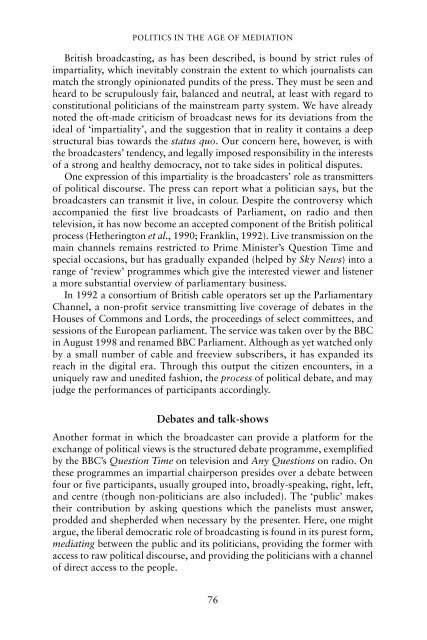20130412164339753295_book_an-introduction-to-political-communication
20130412164339753295_book_an-introduction-to-political-communication
20130412164339753295_book_an-introduction-to-political-communication
Create successful ePaper yourself
Turn your PDF publications into a flip-book with our unique Google optimized e-Paper software.
POLITICS IN THE AGE OF MEDIATION<br />
British broadcasting, as has been described, is bound by strict rules of<br />
impartiality, which inevitably constrain the extent <strong>to</strong> which journalists c<strong>an</strong><br />
match the strongly opinionated pundits of the press. They must be seen <strong>an</strong>d<br />
heard <strong>to</strong> be scrupulously fair, bal<strong>an</strong>ced <strong>an</strong>d neutral, at least with regard <strong>to</strong><br />
constitutional politici<strong>an</strong>s of the mainstream party system. We have already<br />
noted the oft-made criticism of broadcast news for its deviations from the<br />
ideal of ‘impartiality’, <strong>an</strong>d the suggestion that in reality it contains a deep<br />
structural bias <strong>to</strong>wards the status quo. Our concern here, however, is with<br />
the broadcasters’ tendency, <strong>an</strong>d legally imposed responsibility in the interests<br />
of a strong <strong>an</strong>d healthy democracy, not <strong>to</strong> take sides in <strong>political</strong> disputes.<br />
One expression of this impartiality is the broadcasters’ role as tr<strong>an</strong>smitters<br />
of <strong>political</strong> discourse. The press c<strong>an</strong> report what a politici<strong>an</strong> says, but the<br />
broadcasters c<strong>an</strong> tr<strong>an</strong>smit it live, in colour. Despite the controversy which<br />
accomp<strong>an</strong>ied the first live broadcasts of Parliament, on radio <strong>an</strong>d then<br />
television, it has now become <strong>an</strong> accepted component of the British <strong>political</strong><br />
process (Hethering<strong>to</strong>n et al., 1990; Fr<strong>an</strong>klin, 1992). Live tr<strong>an</strong>smission on the<br />
main ch<strong>an</strong>nels remains restricted <strong>to</strong> Prime Minister’s Question Time <strong>an</strong>d<br />
special occasions, but has gradually exp<strong>an</strong>ded (helped by Sky News) in<strong>to</strong> a<br />
r<strong>an</strong>ge of ‘review’ programmes which give the interested viewer <strong>an</strong>d listener<br />
a more subst<strong>an</strong>tial overview of parliamentary business.<br />
In 1992 a consortium of British cable opera<strong>to</strong>rs set up the Parliamentary<br />
Ch<strong>an</strong>nel, a non-profit service tr<strong>an</strong>smitting live coverage of debates in the<br />
Houses of Commons <strong>an</strong>d Lords, the proceedings of select committees, <strong>an</strong>d<br />
sessions of the Europe<strong>an</strong> parliament. The service was taken over by the BBC<br />
in August 1998 <strong>an</strong>d renamed BBC Parliament. Although as yet watched only<br />
by a small number of cable <strong>an</strong>d freeview subscribers, it has exp<strong>an</strong>ded its<br />
reach in the digital era. Through this output the citizen encounters, in a<br />
uniquely raw <strong>an</strong>d unedited fashion, the process of <strong>political</strong> debate, <strong>an</strong>d may<br />
judge the perform<strong>an</strong>ces of particip<strong>an</strong>ts accordingly.<br />
Debates <strong>an</strong>d talk-shows<br />
Another format in which the broadcaster c<strong>an</strong> provide a platform for the<br />
exch<strong>an</strong>ge of <strong>political</strong> views is the structured debate programme, exemplified<br />
by the BBC’s Question Time on television <strong>an</strong>d Any Questions on radio. On<br />
these programmes <strong>an</strong> impartial chairperson presides over a debate between<br />
four or five particip<strong>an</strong>ts, usually grouped in<strong>to</strong>, broadly-speaking, right, left,<br />
<strong>an</strong>d centre (though non-politici<strong>an</strong>s are also included). The ‘public’ makes<br />
their contribution by asking questions which the p<strong>an</strong>elists must <strong>an</strong>swer,<br />
prodded <strong>an</strong>d shepherded when necessary by the presenter. Here, one might<br />
argue, the liberal democratic role of broadcasting is found in its purest form,<br />
mediating between the public <strong>an</strong>d its politici<strong>an</strong>s, providing the former with<br />
access <strong>to</strong> raw <strong>political</strong> discourse, <strong>an</strong>d providing the politici<strong>an</strong>s with a ch<strong>an</strong>nel<br />
of direct access <strong>to</strong> the people.<br />
76
















